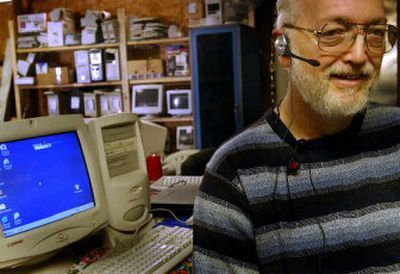Sharing technology

Americans own about 2 billion electronic gadgets, or 25 per household, according to a recent Christian Science Monitor article.
And that proliferation of PCs, televisions, cell phones, iPods and PDAs creates a problem: As we buy newer models, most of us discard their predecessors, and they eventually find their way into dumps.
That’s troublesome because circuit boards, cathode ray tubes and other components contain metals such as mercury, cadmium and lead, all harmful if they leach into our groundwater.
But at least one local organization is doing something about it: The North Idaho Computer Users Group collects old computers, upgrades them, and then distributes them to needy individuals and nonprofit organizations.
According to the group’s president, Bill Sever, members have recycled 30 to 40 machines during the past four years. Recipients include Anchor House, individuals of limited financial means, the Hayden GEMS Senior Center and others.
Sever says Anchor House uses its donated machine to support a children’s foster care program.
The group gave the parents of home-schooled children a pair of computers a couple of years ago, he says. The machines so helped the youngsters that the parents decided to buy newer ones with more capability, then returned the donated machines to the group for use by others.
Barbara Tennery, the Hayden Senior Center director, said the users group donated four upgraded computers to her organization about two years ago. Users group members then networked them, enabling the seniors to share files and printers and to access the Internet. They also provided training to the new users.
In the flash-changing computer world, those computers, which the group loaded with Windows 98 programs, are now out of date, and Tennery hopes the users group will find machines with the more sophisticated Windows XP operating system for the Hayden seniors.
In order to do that, says Sever, his outfit will need computers that have a minimum of 10 gigabyte hard drives, at least 333 megahertz processors and the capability of holding at least 250 megabytes of random access memory.
“That’s the kind of machines we’re looking for now,” he says. “It doesn’t make sense to rehabilitate slow computers that can’t handle the content that’s now on the Web.”
Sever says his organization prefers that donors provide the complete package, consisting of a computer, keyboard, monitor and mouse, “but we’ll take individual components and mate them up with others.”
According to Sever, the users group reformats hard drives and reinstalls operating systems to help ensure that data stored on donated hard drives is obliterated.
He suggests, however, that before discarding a computer, the owner should delete all personal data, then use a program like Window Washer to overwrite what remains on the hard drive.
The group doesn’t rehabilitate Apple computers since, says Sever, members don’t have the expertise to work on that type of machine.
The users group, which comprises some 30 men and women, is looking for new members. Sever says that, in addition to learning how to work on computers, they’ll receive training in computer skills.
Former president Bill Jones, who has belonged to the group for three years, says he joined because he needed help with the technology.
“And they gave it to me,” he says. “I learned how to set up the machine, use the Internet, arrange files and store photos and then modify them. I also learned about spreadsheets, and I use them almost every day.”
A now-retired aircraft assembly worker, Jones says he used a computer spreadsheet to determine whether he’d have enough savings and income to quit his job. He now uses other spreadsheets to track his vehicles’ service histories and to follow his utility expenditures.